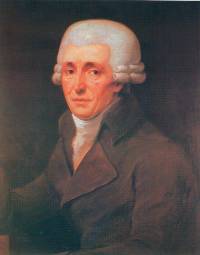Classical Era: Important Composers, Theorists, and Performers: Haydn
Franz Joseph Haydn (1732-1809, Austrian)

![]() Listen to the example below:
Listen to the example below:
Haydn was one of the most fortunate of his contemporaries due to his employment with the Esterházy family. He officially was a servant, but in his 36 years of employment there, he created 90 symphonies, 24 operas, multiple masses, and multiple chamber pieces. During this time he standardized the structures of the symphony and the string quartet, which is why Beethoven and many others called him "Papa Haydn," since he is the father of the symphony.
Although he was unaware of it, Haydn was famous throughout Europe due to the publication of his works. His compositions set the standards for musical technique and taste for the next 50 years. Haydn was dismissed from his post when Prince Esterházy died in 1790. He then moved to Vienna. His ultimate production of compositions is estimated at hundreds of sonatas, 83 quartets, 108 symphonies, operas, and concertos.
![]() Listen to the example below:
Listen to the example below:
Symphony No. 101 in D major (Hoboken 1/101) - 2nd movement: "The Clock" (Chamber Arrangement) (2 minute clip).
Attribution: [GFDL (http://www.gnu.org/copyleft/fdl.html) or CC-BY-SA-3.0 (http://creativecommons.org/licenses/by-sa/3.0/)], via Wikimedia Commons